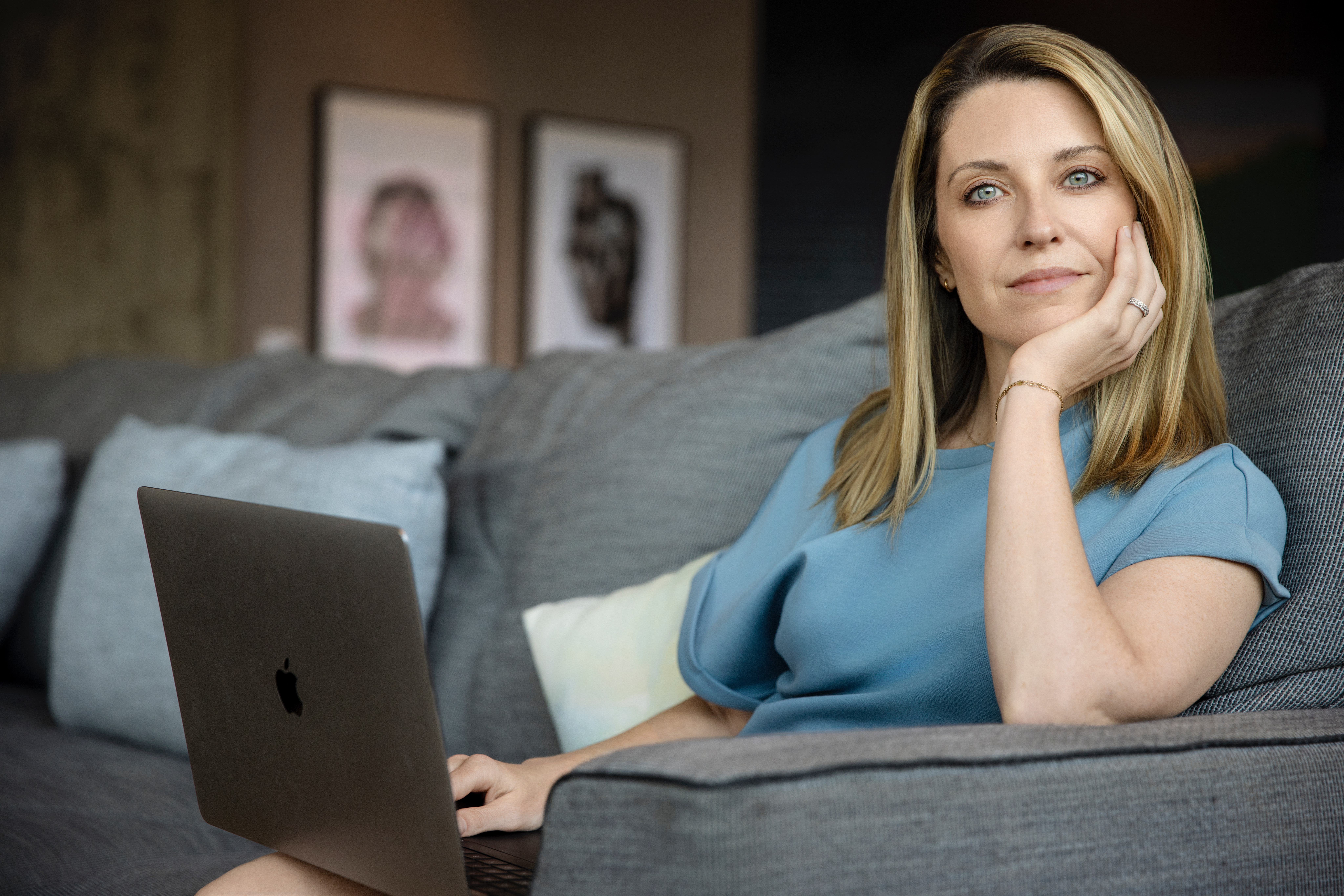What does it really mean to lead a life you love as a modern woman? For Kristen DiOrio and Tara Laffey—co-hosts of The Full Vagine podcast—it means unlearning the rules, making room for joy, and rewriting what ambition, motherhood, and identity look like in midlife. In this refreshingly honest interview, they share the highs, lows, and hilarious realities of raising daughters, managing hormones, building careers, and staying connected to themselves and their community.
Jessi: What does leading a life that you love look like for you?
Kristen: I am living exactly how I want to. I know Chappell Roan recently said that all the moms she knows are super unhappy, and I’m like—well, I guess on a daily basis, do I have to give up the things I want sometimes? Yes. I’ve realized that there is a balance. You do have to make sure you take care of yourself and you have joy. You can’t let their joy overshadow yours.
But this is meaningful for me. My daughter is my best teacher, and maybe I’m hers. It’s not always pretty. It’s not always fun. But I wouldn’t have it any other way. If you asked me, “Would you ever do that by yourself again?”—yes.
It’s so hard, especially going through it in perimenopause, because your hormones go berserk and she’s in puberty. We’ve got puberty and reverse puberty. Hormones are coming in. We’re either crying or yelling at each other.
I lead a life that I love, that I curated by myself, for myself.
Jessi: How do you keep driving forward with ambition while also managing being a mom and your personal life?
Kristen: Sometimes I get overwhelmed. I try to take it day by day. I do the things that, if I dropped them, they would break.
I have to be okay with not being perfect. My house isn’t perfect. I have to be okay with some things being left behind sometimes. I always try to prioritize our happiness first—my happiness—and try to feel as much joy as I can. Because I feel like if I’m happy, she’s happy.
But also, I’m not going to take a job where I’m traveling five days a week. I know there are sacrifices I’ve made because of her—because I want to be there. It’s like everything else: too much of anything is bad. Finding some sort of middle ground, and understanding that I don’t have to have it all right now.
I’m in a place where I have a great job, I have a great boss, I get to do a lot of work I love that’s meaningful. I get free insurance for me and my daughter. I make a good living and I’m okay with that.
I’m okay with doing other stuff on the side and filling my cup creatively. I’m thinking down the road when I have more time and more ability to take risks with money and stuff like that I’ll probably do something different.
Jessi: How has community played a role in your journey up until this point?
Tara: I couldn’t do it without community, honestly. One example is what we call, in our school, “school moms”—our village. Just that community alone, helping with rides, helping out, just listening, going out to lunch, having those women you know are there for you. Your family might be far away or not around.
That is great. Having this community of great women around me, all trying to better themselves, I couldn’t do it without it.
Kristen: I think now is the time when we really need to gather more women together. Women need each other. They need to share their stories. And I think so many women have amazing stories.
You mentioned curiosity, that’s so huge. In the time we’re in, with the political climate, we just need to band together and create that.
Jessi: What are some of the habits that you have that allow you to do what you do every day?
Kristen: Our friendship.
Tara: We try to do a girls’ trip once a year. If we can’t do that, we just get away and laugh because laughter is so important. Not just once a year. Once a year we go on a trip, but then we also do weekends, or try to get together with our friends.
Because I know, for Kristen and me, it’s a nice outlet. We love our families, but it’s nice to have that little time. I know that helps me.
Kristen: And our village is where we live and the friendships we’ve made there.
Exercise is huge for my mental health. I’ve kind of given up on my body at this point. It’s like I could do everything right and still not get the results I want. So I’ve realized I need to do it for my mind more than anything.
Also, I have a therapist. I work out. I have a coach. And I have a medium that I love.
I also do stuff with brain entrainment like brainwaves. Our brainwaves are all at different levels, and there’s music that trains your brain to enter a certain state, whether for focus or for calming down.
I do a lot of spiritual stuff.
Jessi: What do you think stops women from taking opportunities presented to them? Where do you think that hesitation comes from?
Kristen: I don’t want to get into like men versus women, but women are socialized to downplay themselves, to make themselves small and take up less space. Men are not.
My friend’s son plays baseball. He’s in first grade, and he hit a run that kicked off a bunch of other runs. They went from losing 9–0 to winning 10–9. And he goes, “I think it was me that kicked off that entire process.” He’s already giving himself credit.
I don’t think women give themselves credit. Women shrink themselves. They’re not socialized to believe in themselves or build that strong self-concept. Women will shy away from stepping into their power.
That’s something you have to build up. And the older you are, the worse it is. Now, we’re raising girls to be different.
Tara: Now, we’re definitely raising girls to be more confident. The environment is also helping them feel that they can do this. “You’ve got this because so-and-so did it, and so can you.”
Kristen: Geena Davis has an institute where they study how many movies have female leads. For a long time, girls couldn’t see themselves in those leadership roles because every show had a man in charge.
By about six or seven is when they stop believing they can have those kinds of opportunities. So it’s a lifetime of conditioning.
For me? Honestly, it’s my hormones flowing out of my body that made me not give a fuck anymore. I really think part of it is that.
I saw this video once where they said when girls hit puberty, their brains start functioning with hormones from right to left, which is all about relationships and caretaking, because you could potentially become a parent every month. So when women hit midlife, it’s like: “I lived my whole life for someone else. I worried about everybody else. I took care of everyone else.” And finally, you stop and think: “I’m done making my voice small and myself small.”
Jessi: If you could change one rule for women, what would it be?
Kristen: I always felt like I’d live my life differently, not the typical: you go to college, meet someone, get married, have a baby. I chose to do it differently. And I do think that’s changing. Young people are making different choices, and it’s becoming less “this is the one way it has to be.”
But what hasn’t changed much is the emotional load, the weight that women carry as mothers. They hold the emotional health of the entire family. They run the household.
And meanwhile, men can just stand up and walk out.
A man will go to the doctor with his wife and then ask her questions about his own health. Women carry everything. No wonder they’re exhausted. If you’re the one holding the emotional well-being of your family, you’re also the one holding all the information, remembering everything.
Tara: Old school was you’re the mom, you stay home, I work. Leave It to Beaver. “I’m taking care of the kids.”
That’s changed a lot. I don’t think women feel like they have to do that anymore. They’re out there working, raising families, making it all work.
But still, I know women who work full-time, are married, and are still the ones doing the laundry and caring for the kids.
There are definitely men out there who help. My husband always has, and still does. He might not handle the doctor stuff, but he’s always stepped in to help.
Jessi: What’s the legacy that you wish to leave behind?
Tara: The legacy I’d love to leave is to be kind. I feel like it’s such a small word, but it has so much meaning.
If everyone was kind to each other, the world would be a different place. I know we can’t change everything, but that’s what I’d want to be remembered for, that I was kind.
And for my daughters to be kind, to be there for other women, to listen. That’s what I hope to pass on to them.
Kristen: I want my legacy to be: someone who uplifts others. Someone who lifts people’s spirits just by being around them.
I work on myself to be that way, so I can feel joy, so I can share it. I always tell my daughter, “I don’t care about your grades. I care that you’re a good person, that you’re inclusive, that you invite the kid sitting alone to come sit with you.”
That’s what I care about.
Whenever I go to school, I ask the teachers—because she can be quite stubborn at home, so I want to know how it plays out there.
Kristen DiOrio is a passionate leader in talent acquisition, well-being, and women’s empowerment. As the co-creator of The Full Vagine podcast and founder of Pause, a community focused on modern menopause support, she’s on a mission to redefine how women navigate transitions in health, career, and identity. Kristen blends humor, heart, and evidence-based psychology to help others thrive—both in the workplace and beyond. Based in Philadelphia, she’s raising her daughter with intention and building spaces where women feel seen, heard, and supported.
Tara Laffey is the Co-Founder of The Full Vagine podcast. She is also a wife & a mother of two daughters.





